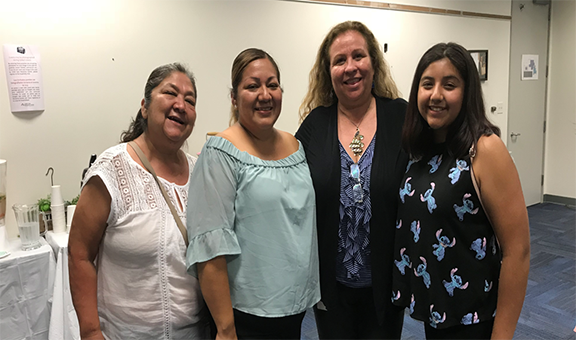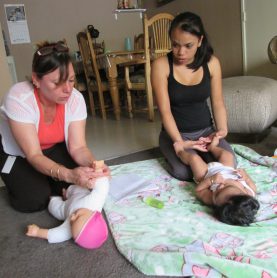At the graduation ceremony for a Child Care Resource Center (CCRC) cohort of Family Child Care (FCC) Apprentices, two graduates – a woman and her mother – credited the home visitation they’d received from a trained professional for their desire to become child care providers.
Celebrating with the two women was their 12-year-old daughter and granddaughter.
“Because of their positive experience with a Home Visitor 12 years ago, that mother and grandmother decided to go into the business of child care together,” CCRC Vice President and COO Ellen Cervantes says. “That warms my heart.”
Through the Home Visiting program, which CCRC adopted in 2008, a trained professional makes regular visits to a new parent’s home to provide guidance, parental coaching, and access to health and social services. With the demand for this highly successful program growing, CCRC is proud to be expanding home visiting as part of a partnership based in Antelope Valley in LA County.
“There’s huge interest in L.A. County and statewide in expanding home visitation services because it’s very effective and important as a model of early intervention and family strengthening,” says Randi Wolfe, Ph.D., Executive Director of Early Care and Education Pathways to Success (ECEPTS). “But there’s no way to expand Home Visiting services if we don’t expand the Home Visiting workforce.”
In order to expand the workforce, CCRC partnered with ECEPTS, Antelope Valley College, and Antelope Valley Partners for Health (AVPH). The partnership secured in early 2020 a $500,000 California Apprenticeship Initiative grant from the Chancellor’s Office of California Community Colleges to cover training-related fees, technology training and support, and on-the-job mentoring of 16-20 Home Visitor apprentices. But until this month, the partnership didn’t have the critical funding needed to provide wages to apprentices. Thanks to our collaborative efforts, the partnership was awarded a $309,250 grant from the Innovation Fund of the LA County Workforce Development Board to pay for apprenticeship wages.
“Within the first week the apprenticeship program was promoted, we had 30 applicants,” Ellen says. “That’s more applicants than space available so we know it has a lot of interest.”
The apprenticeship program will recruit participants who have themselves benefited from the Home Visiting program to be trained and educated on becoming a Home Visitor, outreach worker, or classroom-based early educator. Over three semesters, apprentices will take classes in early childhood to earn their CA Associate Teacher Permit and complete courses in family development and introduction to social service. The program comes at no cost to participants and, while they are in the apprenticeship program, participants will be paid and receive pay increases as their skills develop.
Once training is completed, apprentices will have a direct line of employment with CCRC or other participating partners.
“The critical component of this is that participants don’t have to choose between earning a living and education because they’ll be paid for on-the-job training,” Ellen says. “Apprenticeships have long been held by pipefitters, electricians, and other work but we’ve finally convinced the workforce development system to invest in work that’s often held by low-income women of color. That’s real system change that I’m extremely proud of.”
The Home Visiting Program gives pregnant women and families the resources and skills to raise children who are physically, socially, and emotionally healthy and ready to learn.
“A lot of women who are low income and raising children on their own are isolated, but through the Home Visit program, they meet other mothers and make friends and relationships within their own community,” Ellen says. “It creates community connection, which strengthens the community.”
Since 2016, CCRC and ECEPTS have been collaborating with ECE employers, community colleges and the SEIU Early Educator Training Center to design and pilot successful state-registered apprenticeships for center-based child care workers, Head Start teachers, and licensed Family Child Care Providers. The vast majority of the nearly 500 participants were low-income women of color, recent immigrants, working mothers, and non-traditional students.
CCRC is grateful for the support of Los Angeles County Supervisor Kathryn Barger, JVS SoCal, WDACS. Apply for the program here.

(Above: Family who completed Home Visitor program 12 years ago)


